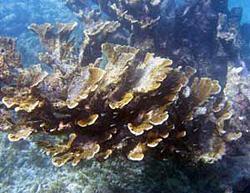
“We're seeing more dead and dying coral than we should be seeing on healthy reefs,” said Mark Patterson, a Virginia Institute of Marine Science researcher and part of the expedition “Bonaire: Exploring Coral Reef Sustainability with New Technologies.”
The expedition members are using three underwater robots to scout the reefs and gather data on them, said Art Trembanis, assistant professor of geology at UD. The use of the robots, known as autonomous underwater vehicles, or AUVs, is giving the scientists an unprecedented opportunity to build their assessment of the reefs.
“Traditional diving approaches are possible and quite popular here but provide only a very limited snapshot of the environment in terms of depth and endurance capability,” noted Trembanis. “The robots have been working tirelessly in over a dozen sites scattered around the island from the shore to record-setting depths of 220 meters and beyond.”
Patterson and Trembanis joined a group of organizational and governmental representatives from the United States, Mexico, France, Australia, and Bonaire to kick off IYOR.
Patterson said that Bonaire is known to have one of the healthiest reefs in the Caribbean, but his team is seeing places where the reefs face challenges. The team has noted the spread of a macro algae from deeper to shallower waters as well as a kind of blue-green algae, both of which can be harmful to reefs.
The scientists have seen some signs of strength, he noted, such as a small resurgence of black spiny sea urchins, which were killed off by a pathogen in the 1980s. In addition, the team noted that the existence of a plentiful stock herbivorous fish that help keep algae under control was also an indicator of good reef health.
“We want to emphasize the importance of reefs to life on Earth and to emphasize the importance of doing something about it,” said Vice Admiral Conrad Lautenbacher, undersecretary of commerce and National Oceanic and Atmospheric Administration (NOAA) administrator.
Speakers at the briefing said that reefs around the world face challenges from changes such as increased sediment eroding from land and rising global temperatures.
“Reefs are evolved for the current climate,” said Clive Wilkinson, coordinator of the Global Coral Reef Monitoring Network. While coral reefs inhabit warm coastal waters, they have temperature thresholds and are not adapted to increasingly warmer global temperatures.
Additionally, Wilkinson said, increased amounts of carbon dioxide, a greenhouse gas associated with global warming, are dissolving in seawater. That lowers the pH level and the water becomes more acidic, making it harder for corals to build their hard skeletons.
The work being done by the Bonaire expedition will be a helpful management tool for the government of Bonaire. The island's reefs have been protected since the 1970s, when it became illegal to break coral and take it from the water.
“We challenge the world to follow our example,” said Herbert Domacasse, Bonaire's governor. “A small island that can hardly be seen from the world map cannot do it alone. We have to do it together.”
For detailed coverage of the Bonaire expedition, which is funded by NOAA, visit NOAA's Ocean Explorer web site at [www.oceanexplorer.noaa.gov/explorations/08bonaire/welcome.html].
To learn more about International Year of the Coral Reef, visit [www.iyor.org].
For more about UD's College of Marine and Earth Studies, visit [www.ocean.udel.edu].
Article by Elizabeth Boyle
Photo, courtesy of NOAA and “Bonaire 2008: Exploring Coral Reef Sustainability with New Technologies,” can be found at [www.oceanexplorer.noaa.gov/explorations/08bonaire/logs/jan20/jan20.html].

